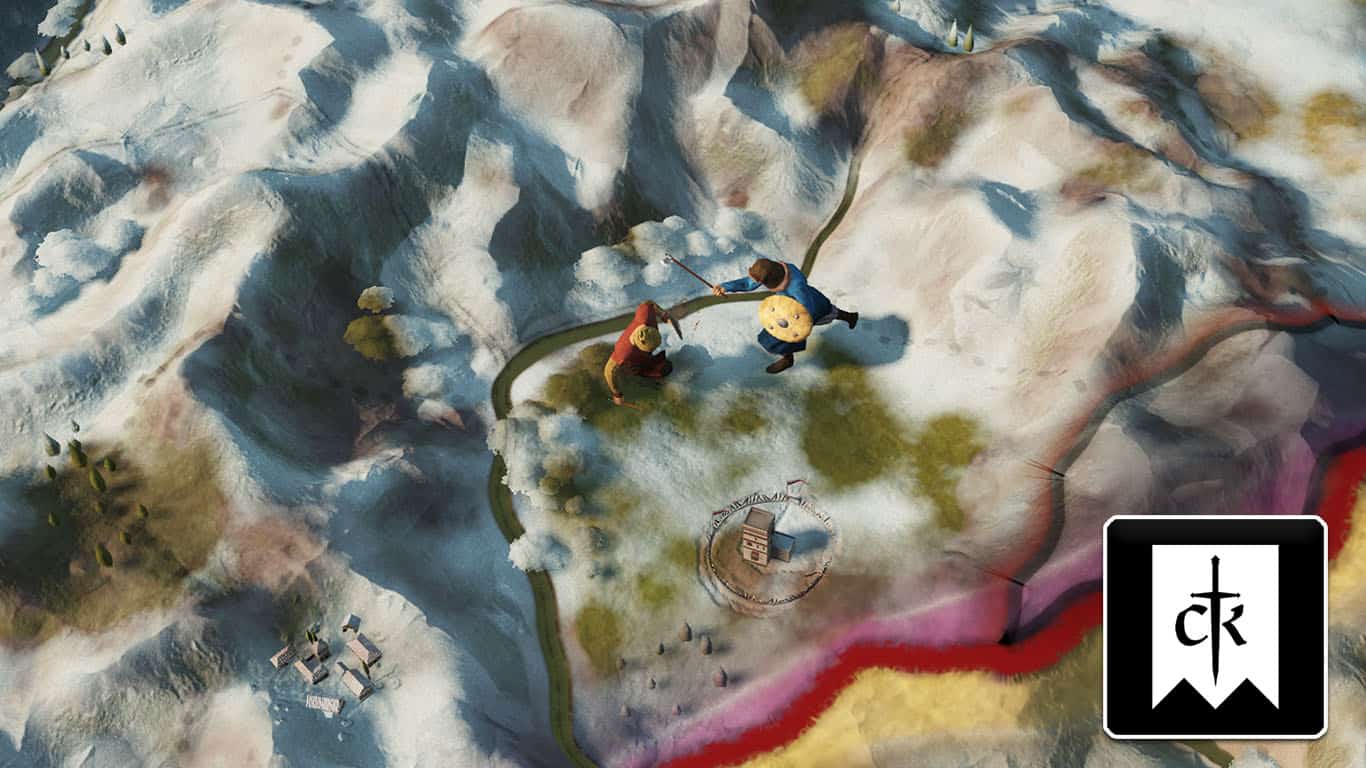One huge part of the grand strategy game Crusader Kings 3 is warfare. You will spend most of your time in wars either to defend your territories or to expand them.
Whatever your reason for war, you will need to know how to properly defeat your enemies, as they will always do their best to bring you down.
Recommended Read: What to Do First in Crusader Kings 3
Since you won’t have any chance of becoming the emperor of Earth without defeating an enemy or two, you will need to understand exactly how warfare and combat work in CK3.
So, here is an extensive guide on warfare and combat in Crusader Kings 3, to show you exactly how to win every war you will lead in the game.
Table of contents
- How warfare and combat work in CK3
- Military Strength, Army Composition, Levies, Men-at-Arms, and Mercenaries in CK3 Explained
- How to win battles and wars in CK3 (Understanding terrains and advantage)
How warfare and combat work in CK3
The first thing that we need to understand is how war works in CK3. War can be declared by yourself and the AI on fellow vassals or other independent rulers using a casus belli.
Declaring War
The casus belli is your motive for declaring war. You will always need a motive to declare war, such as a claim on a territory or religious differences.
Though there are many casus bellis you can use in CK3, there is no reason to worry too much about it as you will slowly learn them as you play.
All that you need to know is that, as long as you don’t fight a fellow vassal from the same kingdom, dukedom, or empire, you will always face a whole country when trying to conquer a territory.
Even though you are only declaring the war for a single county, you will still fight the overlord of the vassal that holds that territory.
There are some casus bellis that use the claim of someone else in your court as an excuse to fight and conquer.
The person that will receive the lands you conquer will always go to the claimant, and they will only become your vassal if the title they gain from the war is lower than yours.
So, if you fight for someone’s claim to become a king and you are also a king, the claimant will be independent after you win the war.
War Objectives
All wars will have a major objective that both sides will fight for. It will usually be either territories or capitals.
To win a war you don’t necessarily need to destroy a kingdom to win the war, as you would in Europa Universalis 4. You just need to achieve your war goal, and you can wait afterward.
After some time passes, you can get a 100% war score just because you won your war goal.
War Resolutions
For every war in CK3, there are only three different resolutions:
- Surrender
- White Peace
- Enforce Demands
Surrender will result in your loss and acceptance of whatever demands your enemy might have asked from you, or a huge loss of Prestige and money.
White Peace will result in nobody gaining or losing anything, with the attacker in the war usually losing Prestige and money.
Enforce Demands will result in your victory, with you either gaining your war objectives or getting a lot of money, Piety, and Prestige.
Military Strength, Army Composition, Levies, Men-at-Arms, and Mercenaries in CK3 Explained
The first thing that you will see in CK3 when you enter the screen where you can declare war is the military strength of your enemy and their allies.
To properly understand the strength of your future rival, you need to check their character screen, where you can see all the details regarding their armies, such as their army composition.
Army Composition
Armies are made up of four different types of troops:
- Levies
- Men-at-Arms
- Knights
- Commander
Levies
Levies are the normal peasant troops, and they represent the core of your army. You will always have more levies than anything else, and they will be the weakest part of your army.
Levies are represented by the lands that you directly own and how developed they are. You will also get a percentage of levies from your vassals.
In terms of power, levies are really weak, but they will usually win if they are more numerous than the enemy and have a good general at the head.
Men-at-Arms
Men-at-Arms are specialized, elite troops that will usually turn around most battles in CK3. They have many types and will require you to pay some attention if you want to defeat all your enemies.
They will make a huge difference in the early and mid-game, as they will help you overcome armies that are similarly powerful in terms of numbers.
There are six major men-at-arms types that all defeat one another in a rock-paper-scissors fashion (the one to the right beats the one to the left):
<- Archers <- Skirmishers <- Heavy Infantry <- Spearmen <- Cavalry
You won’t have to remember this fighting “circle” as you will see who defeats what when looking at the men-at-arms menu.
A way you can properly fight a powerful rival in CK3 is to prepare your men-at-arms to properly counter the men-at-arms of your enemy.
Using the men-at-arms that counter your enemy will give you a huge advantage and will allow you to win battles, even at a disadvantage.
However, if you can’t afford to change your men-at-arms at any time, you can also just make some special troops more powerful than the rest by constructing unique buildings.
There are some buildings in CK3 that can increase the damage and toughness of some of the men-at-arms, and all you need to do is construct them.
The last men-at-arms that you should know about are the ones that help with sieges. Since you only get +1 siege points per day, a couple of catapults that can double that daily amount will severely quicken your siege progress.
This is why you should always have the best possible siege men-at-arms in your army, depending on what technological level you are at.
Knights
Knights in CK3 are powerful juggernauts that can defeat hundreds of troops by themselves.
Though you should never try sending only knights to fight an army, you should know that powerful knights have the damage output of thousands of troops.
The number of knights you can field at the same time will be decided by the rank of your title. A king will always have more knights than a count and a duke.
A single levy troop will have 10 damage and toughness. One knight will have 10 toughness and 100 damage per point in prowess.
This means that a 20 prowess knight has 2000 damage and 200 toughness, which means a good knight can fight and defeat at least 200 levies.
In the Military menu, you can choose exactly who in your court can be your knight and who can’t. Depending on the situation, your knights can easily die in battle.
This is why you should forbid some of the possible knights to actually get this position, as they can easily die even with a high prowess score.
You can also force various characters to become knights, allowing you to risk the lives of some of the more annoying courtiers and vassals.
Commander
The commander is the most important part of your army. They will lead all of the previously mentioned troops into battle and will allow them to get many bonuses in battles.
The stat that matters for these commanders is the Martial stat, as it will allow the commander to get an advantage over the enemy army if their Martial ability is higher.
This advantage in battle will increase the amount of damage your army deals in battle, allowing you to win them easier and faster, with fewer casualties.
Commanders also have special traits that will directly influence the battle, and there are many traits for each circumstance.
As long as you don’t find yourself in weird circumstances, you should usually name the character with the highest number for commander advantage if you want to win most battles.
However, don’t expect an incredible commander to automatically win battles for you. Players still need enough levies and high-quality men-at-arms and knights to win most battles.
How to win battles and wars in CK3 (Understanding terrains and advantage)
All battles and combat in CK3 will be decided by who manages to bring down the morale of the other army first.
To win a battle, you will need to deal a lot of damage and scare the enemy off. This is why advantage is the most important factor in battles in CK3.
Advantage is a combination of many things:
- Terrain
- Commander Skill
- Dice Roll
Terrain will usually be the most impactful thing in battles, as it will severely impact both men-at-arms’ damage in the battle and overall army advantage.
To get the advantage based on the terrain, you will need to be on the defensive in battle. This can be harder to achieve than it might sound.
To get a defensive bonus, you will need to be in a territory before the army that you want to fight gets there. You will need to be the one defending.
However, if you are sieging a castle and an army attacks you, they will get the defensive bonus. So, if you want to get the defensive bonus over a weaker enemy, you will need to attack them while they are sieging one of your castles.
The most powerful defensive modifiers come from mountains and when crossing rivers. Armies will also get a short debuff when they disembark from a boat.
The last thing that can influence your battles are random dice rolls. However, there is nothing to worry about if you make sure that all the other circumstances are met properly.
That’s everything you need to know about warfare and combat in Crusader Kings 3!
Have any input or suggestions for this guide? Let us know in the comment section below.




